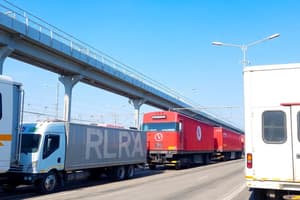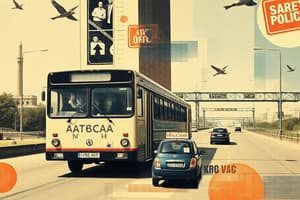Podcast
Questions and Answers
What is the first stage of the transport planning process?
What is the first stage of the transport planning process?
- Problem Definition (correct)
- Projection
- Options
- Constraints
Which aspect is most likely analyzed during the 'Testing of Alternatives' stage?
Which aspect is most likely analyzed during the 'Testing of Alternatives' stage?
- Environmental constraints
- Cost benefit analysis (correct)
- Political implications
- Trip generation studies
What does the 'Modal Split' sub model primarily determine?
What does the 'Modal Split' sub model primarily determine?
- The number of trips by each mode of transport (correct)
- The allocation of trips between zones
- The total number of trips produced
- The types of transport modes available
Which type of constraint is not mentioned as part of the constraints in transport planning?
Which type of constraint is not mentioned as part of the constraints in transport planning?
What is the primary focus during the 'Diagnosis' stage of the transport planning process?
What is the primary focus during the 'Diagnosis' stage of the transport planning process?
Which of the following is not part of the eight stages in the transport planning process?
Which of the following is not part of the eight stages in the transport planning process?
In the context of transport planning, what does 'Trip Generation' refer to?
In the context of transport planning, what does 'Trip Generation' refer to?
What is the main purpose of the 'Evaluation' stage in transport planning?
What is the main purpose of the 'Evaluation' stage in transport planning?
What is the expected urbanization rate of the Philippines by 2030?
What is the expected urbanization rate of the Philippines by 2030?
Which population growth rate was highest during the period from 1960 to 1970?
Which population growth rate was highest during the period from 1960 to 1970?
As of 2005, what percentage of the Philippines' population lived in urban areas?
As of 2005, what percentage of the Philippines' population lived in urban areas?
What is the average population growth rate in cities outside Metro Manila from 2000 to 2007?
What is the average population growth rate in cities outside Metro Manila from 2000 to 2007?
How many highly urbanized cities currently exist in the Philippines?
How many highly urbanized cities currently exist in the Philippines?
What factor is considered important for understanding how cities function according to the content?
What factor is considered important for understanding how cities function according to the content?
What was the total population of the Philippines in 2000?
What was the total population of the Philippines in 2000?
What was the overall national population growth rate from 2000 to 2007?
What was the overall national population growth rate from 2000 to 2007?
What role does geography play in transportation productivity?
What role does geography play in transportation productivity?
Which factor is primarily intended to support a nation's political policies?
Which factor is primarily intended to support a nation's political policies?
How does competition affect transportation development?
How does competition affect transportation development?
What is a significant impact of urbanization on transportation?
What is a significant impact of urbanization on transportation?
What type of transportation is considered to have the lowest level of physical constraints?
What type of transportation is considered to have the lowest level of physical constraints?
What factor does not directly influence transportation routes?
What factor does not directly influence transportation routes?
Which mode of transportation relies heavily on speed to compete effectively?
Which mode of transportation relies heavily on speed to compete effectively?
Which factor impacts the economic utility of natural resources during transportation?
Which factor impacts the economic utility of natural resources during transportation?
What is the primary purpose of the Motor Vehicle User's Charge (MVUC) as stated in Republic Act No. 8794?
What is the primary purpose of the Motor Vehicle User's Charge (MVUC) as stated in Republic Act No. 8794?
Which of the following is NOT one of the Special Trust Accounts created under the MVUC Law?
Which of the following is NOT one of the Special Trust Accounts created under the MVUC Law?
What issue contributes to the lack of urban transport-related projects in the Comprehensive Development Plan (CDP)?
What issue contributes to the lack of urban transport-related projects in the Comprehensive Development Plan (CDP)?
What does the DILG implement to ensure the effective use of funds from the Special Local Road Fund (SLRF)?
What does the DILG implement to ensure the effective use of funds from the Special Local Road Fund (SLRF)?
Which of the following represents the Philippines' commitment to environmentally sustainable transport?
Which of the following represents the Philippines' commitment to environmentally sustainable transport?
Which fund is primarily focused on air pollution control as per the MVUC Law?
Which fund is primarily focused on air pollution control as per the MVUC Law?
What is a noted outcome of the DILG's experience in managing the SLRF?
What is a noted outcome of the DILG's experience in managing the SLRF?
What has been identified as a barrier to effectively undertaking environmentally sustainable transport initiatives?
What has been identified as a barrier to effectively undertaking environmentally sustainable transport initiatives?
What is a significant consequence of deregulated public transport in the country?
What is a significant consequence of deregulated public transport in the country?
Which of the following statements about traffic accident data sources is true?
Which of the following statements about traffic accident data sources is true?
What is the primary function of the local budget or treasury office in relation to transport funding?
What is the primary function of the local budget or treasury office in relation to transport funding?
What operational data is provided by the LTFRB?
What operational data is provided by the LTFRB?
Which aspect of transport data is often compromised due to the paper-based system at the MID?
Which aspect of transport data is often compromised due to the paper-based system at the MID?
What role does the MRSU play in relation to traffic accident data?
What role does the MRSU play in relation to traffic accident data?
What is a challenge faced by the Management Information Department (MID) regarding data?
What is a challenge faced by the Management Information Department (MID) regarding data?
How do local government units (LGUs) influence urban transport investment capacity?
How do local government units (LGUs) influence urban transport investment capacity?
Flashcards
Transport Planning Process Evolution
Transport Planning Process Evolution
The development of transport planning over decades, lacking a clear theoretical foundation, but influenced by studies like the Chicago Area Transportation Study.
Chicago Area Transportation Study
Chicago Area Transportation Study
A study that significantly influenced the current model for transport planning.
Transport Planning Key Objectives
Transport Planning Key Objectives
Initially focused on estimating vehicle and passenger volumes over 20 years to inform capacity improvements.
Problem Definition
Problem Definition
Signup and view all the flashcards
Diagnosis
Diagnosis
Signup and view all the flashcards
Projection
Projection
Signup and view all the flashcards
Constraints
Constraints
Signup and view all the flashcards
Options
Options
Signup and view all the flashcards
Formulation of Plans
Formulation of Plans
Signup and view all the flashcards
Testing of Alternatives
Testing of Alternatives
Signup and view all the flashcards
Evaluation
Evaluation
Signup and view all the flashcards
Trip Generation
Trip Generation
Signup and view all the flashcards
Trip Distribution
Trip Distribution
Signup and view all the flashcards
Modal Split
Modal Split
Signup and view all the flashcards
Trip Assignment
Trip Assignment
Signup and view all the flashcards
Urbanization Rate (Philippines)
Urbanization Rate (Philippines)
Signup and view all the flashcards
Urban Density
Urban Density
Signup and view all the flashcards
Geographical Factors
Geographical Factors
Signup and view all the flashcards
Political Policies
Political Policies
Signup and view all the flashcards
MVUC
MVUC
Signup and view all the flashcards
Local Funds
Local Funds
Signup and view all the flashcards
Modes of Transportation
Modes of Transportation
Signup and view all the flashcards
EST (Environmentally Sustainable Transport)
EST (Environmentally Sustainable Transport)
Signup and view all the flashcards
Transport Investment
Transport Investment
Signup and view all the flashcards
Study Notes
Transport Planning Process
- Evolution: Transport planning has developed over 40 years, lacking clear theoretical foundations.
- Chicago Area Transportation Study: Influenced the current model for transport planning used today.
- Key Objectives: Initial focus is on estimating expected vehicle and passenger volumes over two decades to inform capacity increases.
- Stages of Transport Planning:
- Problem Definition: Identify issues and objectives.
- Diagnosis: Examine problem origins from various perspectives.
- Projection: Forecast future conditions, often challenging.
- Constraints: Consider financial, political, and environmental limits on alternatives.
- Options: Explore potential methods to achieve objectives.
- Formulation of Plans: Develop different transport packages.
- Testing of Alternatives: Model performance of each solution against objectives.
- Evaluation: Assess cost-effectiveness through analysis.
Transport Planning Model (TPM)
- Components of TPM:
- Trip Generation: Estimate trips in a zone, including productions and attractions.
- Trip Distribution: Allocate trips between zones.
- Modal Split: Determine trip distribution by transport mode.
- Trip Assignment: Assign trips to the road network based on origin-destination data.
Urban Transport Challenges in the Philippines
- Urbanization Rate: Philippines had 63% urban population in 2005, expected to reach nearly 70% by 2015.
- Population Growth: Significant growth from 48.098 million in 1980 to 76.504 million in 2000.
- Metro Manila Growth: Experienced 4.89% growth rate from 1960 to 1970, now at 2.04% from 2000-2007.
- Urban Challenges: 33 highly urbanized cities face severe transport issues, with an expected urbanization rate of 77% by 2030.
Factors Influencing Urbanization and Transport
- Urban Density: Key for understanding city function and how transport productivity may evolve.
- Geographical Factors: Location of resources drives transport routes and economic utility.
- Political Policies: Influence transport development and integration.
- Military Influence: Impacts transport infrastructure and policy support.
- Technological Advances: Foster new transportation modes and system improvements.
- Competition Among Modes: Encourages innovation and efficiency among transport modes.
Modes of Transportation
- Categories:
- Land: Road, rail, pipelines.
- Water: Shipping.
- Air: Aviation.
Funding for Urban Transport
- Motor Vehicle User's Charge (MVUC): Fund established under Republic Act No. 8794 for transport infrastructure projects.
- Local Funds: Lack of local transport data impedes project identification.
- Performance-Based Grants: Effective local grant management enhances transport funding accountability.
Environmentally Sustainable Transport (EST)
- Commitment to EST: Philippines promotes sustainable transport aligning with the UNFCCC agreements.
- Data Needs: Need for comprehensive data on vehicle registrations, public transport operations, and traffic accidents for planning effectiveness.
- Traffic Accident Data Systems: TARAS and MMARAS track and analyze road accidents to support safety planning.
Transport Investment and Efficiency
- Investment Levels: Identifying sources and utilization of finances is crucial for local government units (LGUs) capacity in urban transport projects.
- Data Integration: Essential for understanding budget allocations and improving transport systems.
Studying That Suits You
Use AI to generate personalized quizzes and flashcards to suit your learning preferences.




